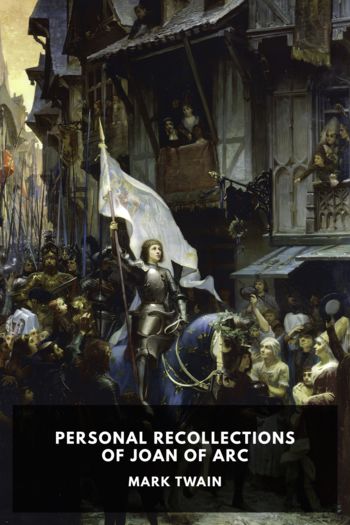A Connecticut Yankee in King Arthur’s Court by Mark Twain (my reading book .TXT) 📕

- Author: Mark Twain
Book online «A Connecticut Yankee in King Arthur’s Court by Mark Twain (my reading book .TXT) 📕». Author Mark Twain
There was a fine manliness observable in almost every face; and in some a certain loftiness and sweetness that rebuked your belittling criticisms and stilled them. A most noble benignity and purity reposed in the countenance of him they called Sir Galahad, and likewise in the king’s also; and there was majesty and greatness in the giant frame and high bearing of Sir Launcelot of the Lake.
There was presently an incident which centered the general interest upon this Sir Launcelot. At a sign from a sort of master of ceremonies, six or eight of the prisoners rose and came forward in a body and knelt on the floor and lifted up their hands toward the ladies’ gallery and begged the grace of a word with the queen. The most conspicuously situated lady in that massed flowerbed of feminine show and finery inclined her head by way of assent, and then the spokesman of the prisoners delivered himself and his fellows into her hands for free pardon, ransom, captivity, or death, as she in her good pleasure might elect; and this, as he said, he was doing by command of Sir Kay the Seneschal, whose prisoners they were, he having vanquished them by his single might and prowess in sturdy conflict in the field.
Surprise and astonishment flashed from face to face all over the house; the queen’s gratified smile faded out at the name of Sir Kay, and she looked disappointed; and the page whispered in my ear with an accent and manner expressive of extravagant derision—
“Sir Kay, forsooth! Oh, call me pet names, dearest, call me a marine! In twice a thousand years shall the unholy invention of man labor at odds to beget the fellow to this majestic lie!”
Every eye was fastened with severe inquiry upon Sir Kay. But he was equal to the occasion. He got up and played his hand like a major—and took every trick. He said he would state the case exactly according to the facts; he would tell the simple straightforward tale, without comment of his own; “and then,” said he, “if ye find glory and honor due, ye will give it unto him who is the mightiest man of his hands that ever bare shield or strake with sword in the ranks of Christian battle—even him that sitteth there!” and he pointed to Sir Launcelot. Ah, he fetched them; it was a rattling good stroke. Then he went on and told how Sir Launcelot, seeking adventures, some brief time gone by, killed seven giants at one sweep of his sword, and set a hundred and forty-two captive maidens free; and then went further, still seeking adventures, and found him (Sir Kay) fighting a desperate fight against nine foreign knights, and straightway took the battle solely into his own hands, and conquered the nine; and that night Sir Launcelot rose quietly, and dressed him in Sir Kay’s armor and took Sir Kay’s horse and gat him away into distant lands, and vanquished sixteen knights in one pitched battle and thirty-four in another; and all these and the former nine he made to swear that about Whitsuntide they would ride to Arthur’s court and yield them to Queen Guenever’s hands as captives of Sir Kay the Seneschal, spoil of his knightly prowess; and now here were these half dozen, and the rest would be along as soon as they might be healed of their desperate wounds.
Well, it was touching to see the queen blush and smile, and look embarrassed and happy, and fling furtive glances at Sir Launcelot that would have got him shot in Arkansas, to a dead certainty.
Everybody praised the valor and magnanimity of Sir Launcelot; and as for me, I was perfectly amazed, that one man, all by himself, should have been able to beat down and capture such battalions of practiced fighters. I said as much to Clarence; but this mocking featherhead only said:
“An Sir Kay had had time to get another skin of sour wine into him, ye had seen the accompt doubled.”
I looked at the boy in sorrow; and as I looked I saw the cloud of a deep despondency settle upon his countenance. I followed the direction of his eye, and saw that a very old and white-bearded man, clothed in a flowing black gown, had risen and was standing at the table upon unsteady legs, and feebly swaying his ancient head and surveying the company with his watery and wandering eye. The same suffering look that was in the page’s face was observable in all the faces around—the look of dumb creatures who know that they must endure and make no moan.
“Marry, we shall have it again,” sighed the boy; “that same old weary tale that he hath told a thousand times in the same words, and that he will tell till he dieth, every time he hath gotten his barrel full and feeleth his exaggeration-mill a-working. Would God I had died or I saw this day!”
“Who is it?”
“Merlin, the mighty liar and magician, perdition singe him for the weariness he worketh with his one tale! But that men fear him for that he hath the storms and the lightnings and all the devils





Comments (0)